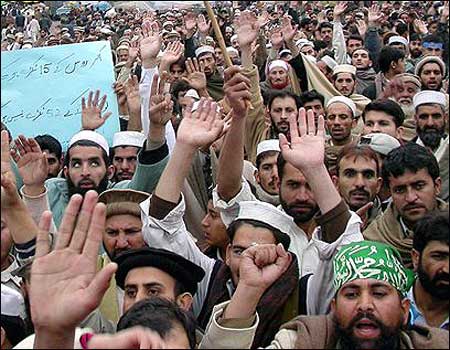This has been for the purpose of ensuring not only a stable democratic transformation of Pakistan, but also a speedy stabilisation and reconstruction of Afghanistan. However, there are two dimensions to the current Pakistani military operations which may backfire if they are not handled tactfully and effectively.
One is the humanitarian dimension. The operations have already resulted in hundreds of civilian casualties and the dislocation of some 2.5million people, creating a massive refugee problem. The Mingora city and its surroundings are badly damaged.
Even if Pakistan succeeds in rapidly reconstructing the areas and in rehabilitating their population, there will still be many long-term human, social and economic grievances on which the extremists could draw to maintain and strengthen their resistance in different forms.
Another is the ethnic dimension. The Pakistan army is dominated by Punjabis, who form the largest of the four main national groups in Pakistan. The other three are the Sindhis, Baluchis and Pathans, with the last one sharing extensive cross-border ties (and the second one less so) with Afghanistan.
Both the Pakistani and Afghan Taliban belong to ethnic Pashtuns (who are also the largest cluster though not the majority of the population in Afghanistan). The Pakistani Pashtuns, together with the Baluchis, have historically viewed themselves as being exploited largely by the Punjabis and partly by the Sindhis. Their discontentment has led them from time to time to mount serious nationalist challenges to Pakistan for either greater autonomy or independence.
In this, they have occasionally been supported by outside forces, most importantly Afghanistan, which has disputed the Afghan-Pakistan border, drawn unilaterally by the British in 1893. During the Cold War, this position of Afghanistan was backed by the Soviet Union as part of a policy of forging close ties with Afghanistan and rebuffing the Pakistan-United States alliance.
Pakistan’s support of various Afghan Pashtun-dominated Islamic resistance groups (the Mujahideen) during the Soviet occupation of Afghanistan in the 1980s produced a double effect. On the one hand, it sharpened the division between the Pashtun and non-Pashtun population of Afghanistan, which has become a perennial problem for the country.
On the other hand, it helped the growth in Pakistan of extreme Islamic groups, in close affiliation with their Afghan counterparts. Pakistan’s subsequent orchestration of the Taliban to take over Afghanistan amounted to another shot in the arm of Pashtun extremists on both sides of the border.
Although at the time Pakistan’s strategy was to export many of Pakistan’s extremists to Afghanistan as a way of diverting their energy from Pakistan, its strategy came unstuck when al-Qaeda, while harboured by the Taliban, attacked the United States on September 11, 2001.
Whereas now the Afghan Taliban are locked in a bloody fight with the Karzai Government and its international backers, most importantly the US and its NATO and non-NATO allies, the Pakistani Taliban are confronted by Pakistan’s Punjabi-dominated military and Sindhi-led government. This has introduced a dangerously polarising ethnic element in the struggle. It has the potential to heighten cross-border Pashtun solidarity and nationalism.
This could easily encourage a similar development among the Baluchis, who also have very deep grievances against Pakistan for exploiting their rich mineral resources and land, brutally suppressing their nationalist demands, and not doing enough to improve their standard of living.
It is now important that Pakistani and Afghan offensives against the Taliban are immediately accompanied by such political and reconstruction steps that could entice the Pashtun populations of both countries into viable processes of national reconciliation and political as well as social and economic integration.
This would require serious changes in the political structures and policy direction of the two states as well as in the strategy of their international backers. They would need to engage in the type of policy actions that could persuade their Pashtun populations to divest themselves of any attraction that the extremist elements in their midst may provide them.
If they fail in this respect, the present conflicts in both countries carry the risk of taking on an ethnic dimension that could prolong their instability and insecurity for decades to come.
It is to this imperative that the Obama Administration will need to direct much of its attention and resources.
Amin Saikal is professor of political science and director of the Centre for Arab and Islamic Studies (the Middle East and Central Asia) at the Australian National University.
This article originally appeared in the Canberra Times on June 3.

